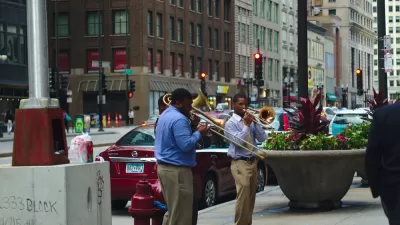An editorial in Crain's suggests that by not taking full advantage of its history with the Blues, Chicago is wasting a precious cultural resource and missing an opportunity for tourism dollars.

Blues songs have told Chicago's story for generations, but a recent piece in Crain's Chicago Business argues the city has been unwilling to return the favor. Besides being home to some of the greatest blues musicians, it's also the site of a living musical culture that could be a boon to the city. "[T]o think of Chicago blues as merely a historic legacy is to overlook its worldwide following in the here and now—and to miss out on a tourism and economic development opportunity that's pumping hundreds of millions of dollars into other cities," Crain’s argues.
Compared to cities like Memphis, St. Louis, and New Orleans, which have built museums and tourism campaigns around their musical heritages, Chicago is lagging behind—both generally and with the blues specifically. "[W]hen tourists land in Chicago seeking a place to learn about the blues, they're pretty much on their own," Crain's writes. While Chicago is host to a major weekend Blues Festival every year, Crain's sees this as not nearly enough. "You'll find no museums here. No statues, no official tours, no markers of the vital clubs where the music gestated on the South and West sides," Crain's writes. These clubs are largely unknown even to local Chicagoans, but they have a powerful story to tell and great music inside.
FULL STORY: Chicago can't afford to squander its blues music legacy

Study: Maui’s Plan to Convert Vacation Rentals to Long-Term Housing Could Cause Nearly $1 Billion Economic Loss
The plan would reduce visitor accommodation by 25,% resulting in 1,900 jobs lost.

North Texas Transit Leaders Tout Benefits of TOD for Growing Region
At a summit focused on transit-oriented development, policymakers discussed how North Texas’ expanded light rail system can serve as a tool for economic growth.

Why Should We Subsidize Public Transportation?
Many public transit agencies face financial stress due to rising costs, declining fare revenue, and declining subsidies. Transit advocates must provide a strong business case for increasing public transit funding.

How to Make US Trains Faster
Changes to boarding platforms and a switch to electric trains could improve U.S. passenger rail service without the added cost of high-speed rail.

Columbia’s Revitalized ‘Loop’ Is a Hub for Local Entrepreneurs
A focus on small businesses is helping a commercial corridor in Columbia, Missouri thrive.

Invasive Insect Threatens Minnesota’s Ash Forests
The Emerald Ash Borer is a rapidly spreading invasive pest threatening Minnesota’s ash trees, and homeowners are encouraged to plant diverse replacement species, avoid moving ash firewood, and monitor for signs of infestation.
Urban Design for Planners 1: Software Tools
This six-course series explores essential urban design concepts using open source software and equips planners with the tools they need to participate fully in the urban design process.
Planning for Universal Design
Learn the tools for implementing Universal Design in planning regulations.
City of Santa Clarita
Ascent Environmental
Institute for Housing and Urban Development Studies (IHS)
City of Grandview
Harvard GSD Executive Education
Toledo-Lucas County Plan Commissions
Salt Lake City
NYU Wagner Graduate School of Public Service





























